-
 Bitcoin
Bitcoin $107,360.0175
0.36% -
 Ethereum
Ethereum $2,425.2303
-1.15% -
 Tether USDt
Tether USDt $1.0003
-0.01% -
 XRP
XRP $2.1850
4.33% -
 BNB
BNB $646.4128
0.37% -
 Solana
Solana $146.0511
2.89% -
 USDC
USDC $0.9998
-0.01% -
 TRON
TRON $0.2754
1.55% -
 Dogecoin
Dogecoin $0.1626
0.80% -
 Cardano
Cardano $0.5599
0.49% -
 Hyperliquid
Hyperliquid $37.2026
0.62% -
 Bitcoin Cash
Bitcoin Cash $499.0346
0.17% -
 Sui
Sui $2.7251
2.86% -
 Chainlink
Chainlink $13.1187
-0.19% -
 UNUS SED LEO
UNUS SED LEO $9.0747
0.54% -
 Avalanche
Avalanche $17.6526
0.87% -
 Stellar
Stellar $0.2373
1.02% -
 Toncoin
Toncoin $2.8387
0.25% -
 Shiba Inu
Shiba Inu $0.0...01136
1.04% -
 Litecoin
Litecoin $85.2460
1.04% -
 Hedera
Hedera $0.1473
2.04% -
 Monero
Monero $314.3978
1.56% -
 Bitget Token
Bitget Token $4.6799
0.81% -
 Dai
Dai $1.0001
0.02% -
 Polkadot
Polkadot $3.3403
0.70% -
 Ethena USDe
Ethena USDe $1.0002
0.02% -
 Uniswap
Uniswap $6.9908
0.77% -
 Pi
Pi $0.5310
-3.57% -
 Pepe
Pepe $0.0...09292
-0.19% -
 Aave
Aave $254.8721
-2.23%
How to create a BTC wallet on MetaMask?
MetaMask doesn't natively support Bitcoin; use wrapped Bitcoin (wBTC) or third-party services to manage BTC through MetaMask, always prioritizing security.
Mar 31, 2025 at 04:57 pm
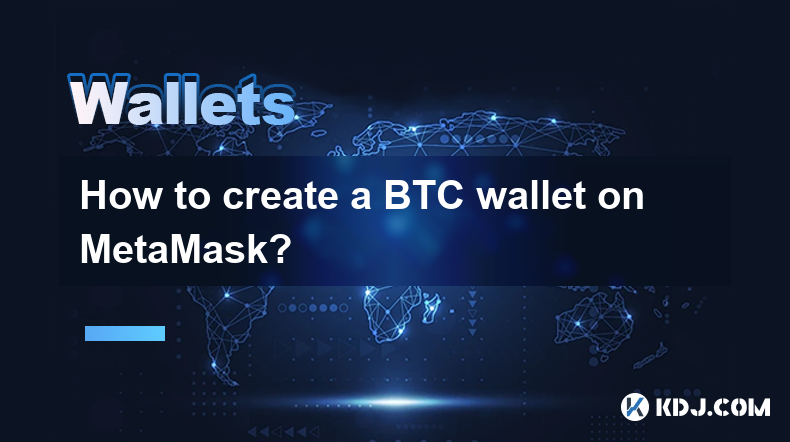
MetaMask is primarily known as an Ethereum wallet, but its functionality has expanded to support other cryptocurrencies, including Bitcoin (BTC), through integrations with other services. You can't directly create a BTC wallet within MetaMask itself in the same way you create an ETH wallet. Instead, you'll use MetaMask to interact with a third-party service that provides Bitcoin wallet functionality. This usually involves connecting your MetaMask account to a Bitcoin service.
Understanding the Limitations
It's crucial to understand that MetaMask doesn't natively support Bitcoin. It's an Ethereum-focused platform. Therefore, holding and managing BTC through MetaMask requires using a bridge or a compatible service. This means your Bitcoin isn't directly stored within the MetaMask extension itself. Instead, a separate service manages your BTC, with MetaMask acting as an interface for interaction. This is a critical distinction to understand before proceeding.
Method 1: Using a Wrapped Bitcoin Service
One common approach involves using wrapped Bitcoin (wBTC). Wrapped Bitcoin is a tokenized version of Bitcoin that lives on the Ethereum blockchain. This allows you to interact with your Bitcoin using Ethereum-compatible wallets like MetaMask.
- Find a reputable wBTC bridge: Research and select a trustworthy service that allows you to wrap your BTC. This process involves sending your actual BTC to the service, which then issues you an equivalent amount of wBTC on the Ethereum blockchain. Examples include RenBridge and Wrapped.com.
- Connect your MetaMask wallet: Once you've chosen a bridge, connect your MetaMask wallet to the platform. You'll need to approve the necessary permissions for the bridge to interact with your MetaMask account.
- Wrap your BTC: Initiate the wrapping process, sending your BTC to the bridge's designated address. After a confirmation, you'll receive wBTC in your MetaMask wallet.
- Manage your wBTC: Now you can manage your wBTC within your MetaMask wallet, just like any other ERC-20 token. Remember, this is a representation of your BTC, not the BTC itself. Unwrapping is necessary to reclaim your actual BTC.
Method 2: Using a Third-Party Bitcoin Wallet Integration
Some third-party services allow direct integration with MetaMask, providing a more seamless Bitcoin management experience. However, always prioritize security and research the reputation of any service you choose.
- Select a compatible service: Look for services that explicitly state MetaMask compatibility for Bitcoin management. Thoroughly vet the service's security features and user reviews.
- Connect your MetaMask: Follow the service's instructions to connect your MetaMask wallet. This typically involves granting specific permissions to the service.
- Manage your BTC: The service will provide tools to manage your BTC, including sending, receiving, and viewing your balance. The exact functionality will depend on the specific service you choose. Remember you are still interacting with your Bitcoin through a third-party service.
Security Considerations
Security is paramount when dealing with cryptocurrencies. Always prioritize using reputable services with strong security measures. Never share your seed phrase or private keys with anyone. Be cautious of phishing scams and only interact with official websites and applications. Regularly back up your MetaMask wallet and keep your software updated. Understand the risks involved in using third-party services.
Frequently Asked Questions
Q: Can I directly store BTC in my MetaMask wallet?
A: No, MetaMask does not natively support Bitcoin. You need to use a bridge or a third-party service that integrates with MetaMask.
Q: What is wrapped Bitcoin (wBTC)?
A: wBTC is a tokenized version of Bitcoin that exists on the Ethereum blockchain. It allows you to interact with your Bitcoin using Ethereum-compatible wallets like MetaMask.
Q: Is using a third-party service safe?
A: The safety of using a third-party service depends entirely on the reputation and security measures of the service provider. Always thoroughly research any service before using it.
Q: What happens if the third-party service goes down?
A: If the third-party service goes down, you may temporarily lose access to your Bitcoin. However, your Bitcoin itself should remain safe, provided the service has implemented proper security measures. You will need to wait for the service to restore functionality.
Q: Is there a risk of losing my BTC using these methods?
A: There's always a degree of risk involved in managing cryptocurrencies. The risks are mitigated by choosing reputable services, employing strong security practices, and understanding the limitations of using a third-party service for managing your Bitcoin. The risk is not inherent to MetaMask itself, but to the intermediary services required to handle Bitcoin.
Q: Can I use any BTC wallet with MetaMask?
A: No. You can only use BTC wallets that have a specific integration or compatibility with MetaMask, typically through wrapped BTC or similar services. Not all Bitcoin wallets are compatible.
Q: What if I lose access to my MetaMask account?
A: If you lose access to your MetaMask account, you will lose access to your wBTC (or any other cryptocurrency stored within it). Ensure you have a secure backup of your seed phrase. Losing your seed phrase means irreversible loss of access to your funds.
Q: Are there fees involved in wrapping and unwrapping BTC?
A: Yes, there are typically fees associated with wrapping and unwrapping BTC, including gas fees on the Ethereum network. These fees can vary depending on network congestion.
Disclaimer:info@kdj.com
The information provided is not trading advice. kdj.com does not assume any responsibility for any investments made based on the information provided in this article. Cryptocurrencies are highly volatile and it is highly recommended that you invest with caution after thorough research!
If you believe that the content used on this website infringes your copyright, please contact us immediately (info@kdj.com) and we will delete it promptly.
- Across Crypto Project Faces Heat: Secret $23M Transfer Sparks Governance Debate
- 2025-06-28 16:30:13
- Trump Coin's Wild Ride: Liquidity Drain, Exchange Deposits, and What It Means for Binance & OKX
- 2025-06-28 16:50:13
- Solana, XRP, and Spot ETFs: A New York Minute on Crypto's Shifting Sands
- 2025-06-28 17:10:13
- Trump, Memecoin Mania, and Whale Watching: A New York Minute in Crypto
- 2025-06-28 16:30:13
- Gemini, Tokenized Stocks, and Europe: A New Era for Investment?
- 2025-06-28 17:10:13
- Shiba Inu, Lending Coins, and Early Holders: A New Frontier
- 2025-06-28 16:51:59
Related knowledge

How to stake cryptocurrencies on Coinbase? Benefits and risks
Jun 27,2025 at 06:36pm
Understanding Cryptocurrency Staking on CoinbaseStaking cryptocurrencies involves locking up digital assets to support the operations of a blockchain network, typically in return for rewards. Coinbase, one of the most popular cryptocurrency exchanges globally, offers staking services for several proof-of-stake (PoS) coins. Users can stake their holdings...

How to contact Coinbase customer service? Support channels and response times
Jun 28,2025 at 01:29pm
Contacting Coinbase Customer Service: Support Channels and Response TimesIf you're a user of Coinbase, reaching their customer service team may become necessary for various reasons, such as account verification issues, transaction disputes, or technical difficulties. Understanding the different support channels available and what to expect in terms of r...
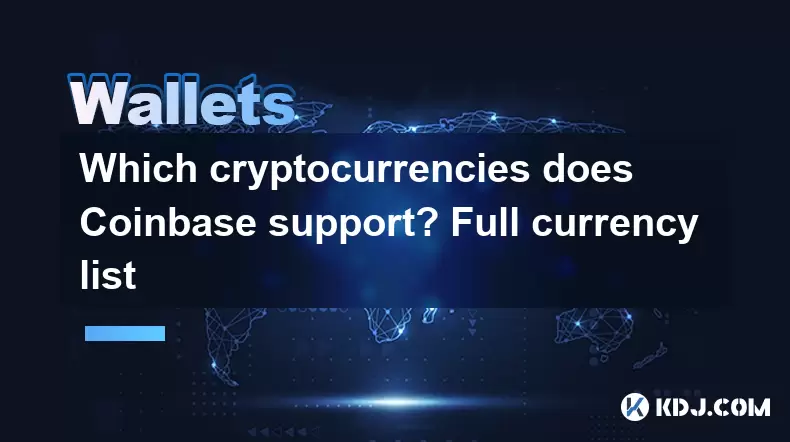
Which cryptocurrencies does Coinbase support? Full currency list
Jun 28,2025 at 08:36am
Overview of Cryptocurrencies Supported by CoinbaseCoinbase is one of the most popular and trusted cryptocurrency exchanges globally. It provides users with a platform to buy, sell, trade, and store various digital assets. As of the latest updates, Coinbase supports over 200 cryptocurrencies, including major ones like Bitcoin (BTC), Ethereum (ETH), and L...
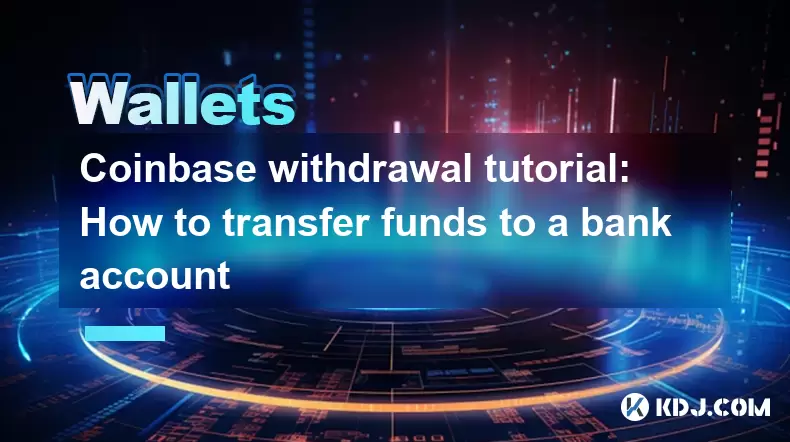
Coinbase withdrawal tutorial: How to transfer funds to a bank account
Jun 28,2025 at 02:35am
Understanding Coinbase WithdrawalsCoinbase is one of the most widely used cryptocurrency platforms, allowing users to buy, sell, and store digital assets. Once you've successfully traded or held your crypto on Coinbase, the next logical step may be to withdraw funds to a bank account. This process involves converting your cryptocurrency into fiat curren...
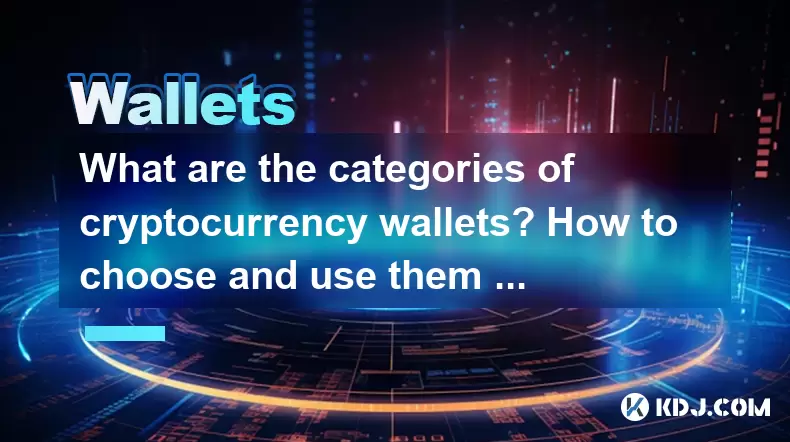
What are the categories of cryptocurrency wallets? How to choose and use them safely?
Jun 21,2025 at 10:42pm
Understanding Cryptocurrency WalletsCryptocurrency wallets are essential tools for anyone involved in the digital asset ecosystem. They allow users to store, send, and receive cryptocurrencies securely. Unlike traditional wallets that hold physical money, crypto wallets manage cryptographic keys—private and public—which interact with blockchain networks...
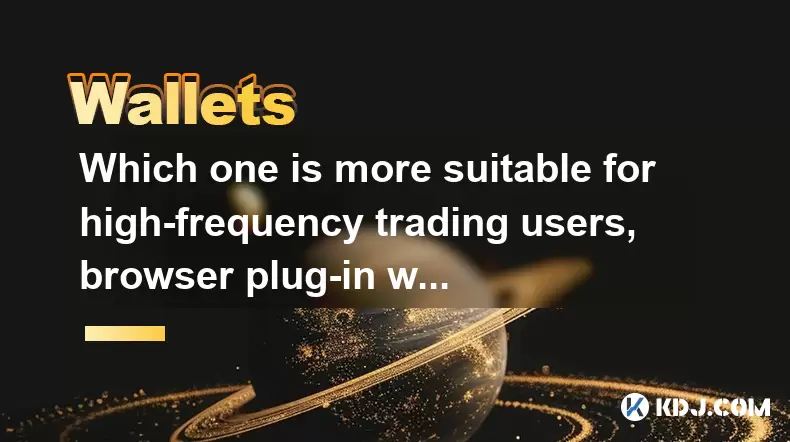
Which one is more suitable for high-frequency trading users, browser plug-in wallets or independent application wallets?
Jun 23,2025 at 08:22am
Understanding the Role of Wallets in High-Frequency TradingFor high-frequency trading (HFT) users in the cryptocurrency market, wallet selection is critical due to the need for speed, security, and seamless integration with trading platforms. HFT involves executing a large number of trades within seconds or even milliseconds, which demands a wallet that...

How to stake cryptocurrencies on Coinbase? Benefits and risks
Jun 27,2025 at 06:36pm
Understanding Cryptocurrency Staking on CoinbaseStaking cryptocurrencies involves locking up digital assets to support the operations of a blockchain network, typically in return for rewards. Coinbase, one of the most popular cryptocurrency exchanges globally, offers staking services for several proof-of-stake (PoS) coins. Users can stake their holdings...

How to contact Coinbase customer service? Support channels and response times
Jun 28,2025 at 01:29pm
Contacting Coinbase Customer Service: Support Channels and Response TimesIf you're a user of Coinbase, reaching their customer service team may become necessary for various reasons, such as account verification issues, transaction disputes, or technical difficulties. Understanding the different support channels available and what to expect in terms of r...

Which cryptocurrencies does Coinbase support? Full currency list
Jun 28,2025 at 08:36am
Overview of Cryptocurrencies Supported by CoinbaseCoinbase is one of the most popular and trusted cryptocurrency exchanges globally. It provides users with a platform to buy, sell, trade, and store various digital assets. As of the latest updates, Coinbase supports over 200 cryptocurrencies, including major ones like Bitcoin (BTC), Ethereum (ETH), and L...

Coinbase withdrawal tutorial: How to transfer funds to a bank account
Jun 28,2025 at 02:35am
Understanding Coinbase WithdrawalsCoinbase is one of the most widely used cryptocurrency platforms, allowing users to buy, sell, and store digital assets. Once you've successfully traded or held your crypto on Coinbase, the next logical step may be to withdraw funds to a bank account. This process involves converting your cryptocurrency into fiat curren...

What are the categories of cryptocurrency wallets? How to choose and use them safely?
Jun 21,2025 at 10:42pm
Understanding Cryptocurrency WalletsCryptocurrency wallets are essential tools for anyone involved in the digital asset ecosystem. They allow users to store, send, and receive cryptocurrencies securely. Unlike traditional wallets that hold physical money, crypto wallets manage cryptographic keys—private and public—which interact with blockchain networks...

Which one is more suitable for high-frequency trading users, browser plug-in wallets or independent application wallets?
Jun 23,2025 at 08:22am
Understanding the Role of Wallets in High-Frequency TradingFor high-frequency trading (HFT) users in the cryptocurrency market, wallet selection is critical due to the need for speed, security, and seamless integration with trading platforms. HFT involves executing a large number of trades within seconds or even milliseconds, which demands a wallet that...
See all articles
























































































